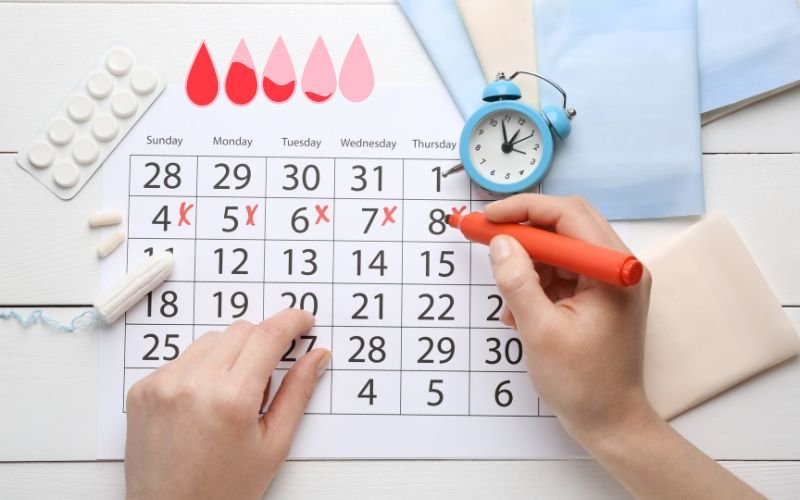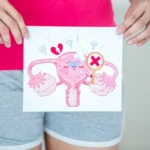Irregular periods can be frustrating, causing confusion and discomfort for many women. Acquainting yourself with the reasons behind the changes is important if your period arrives early or you want to learn how periods come fast. Stress, hormonal imbalances, contraceptive use, and lifestyle factors often disrupt menstrual cycles, while natural methods like herbal teas, spices, and light exercise may help regulate them. Read this blog to learn about the common causes of early periods and natural tips on encouraging your period to arrive when needed.
Why Do Periods Come Early?
Periods can come early for a variety of reasons, often related to hormonal fluctuations or lifestyle changes. Here are some of the main causes:
Stress and Its Impact
Stress is a major reason for changing menstrual cycles. Being under chronic stress can also cause your body to release cortisol, which can alter how reproductive hormones such as estrogen and progesterone are produced in typical cycles. They can cause your periods to come earlier due to a hormonal imbalance. Stress levels can also be managed through yoga, meditation, or simple regular physical exercises that help maintain the balance of hormones in a woman’s body, contributing to menstrual cycles while keeping them regular.
Hormonal Imbalance
Hormonal imbalances, primarily related to estrogen and progesterone, can cause periods to come early. Such imbalances might occur due to changes in diet, excessive physical activity, thyroid issues, or other underlying health problems. Keeping your hormones balanced with a healthy lifestyle and regular checkups can help regulate your cycle.
Contraceptive Use
Hormonal birth control pills and other contraceptive methods can impact your menstrual cycle timing. Birth control pills are a hormone cycle that, when not taken in time or skipped, disrupts the hormonal balance and may cause periods to arrive earlier than expected. Following your birth control properly can help prevent these abnormalities.
Polycystic Ovary Syndrome (PCOS)
Women with PCOS often experience early periods or skipped cycles due to increased levels of androgens (male hormones). Studies indicate that approximately 30% of women experience menstrual irregularities due to hormonal imbalances, particularly those related to conditions like Polycystic Ovary Syndrome (PCOS). If you suspect PCOS, consult a gynaecologist in rohini for a diagnosis and proper management.
Diet and Lifestyle Changes
The disruptions in diet and heavy exercise can cause your periods to come early. Hormone production can be affected by extreme dieting, and with too much exercise (or lack of eating enough food), your estrogen levels drop, which will also disrupt the menstrual cycle. Regular periods are necessary for good health, maintaining a balanced diet, and moderate exercise.
Menopause or Perimenopause
As women near menopause, changes in the menstrual cycle can occur — some people may have periods early or late. Perimenopause, the time just before menopause, is known for erratic hormone changes and shorter or heavier periods in the mid-thirties. This stage may span several years, during which one experiences hot flashes and mood swings to go along with menstrual changes.
Medical Conditions That Cause Irregular Periods
Irregular menstrual cycles can cause concern for many women, often indicating underlying medical conditions. While Polycystic Ovary Syndrome (PCOS) is commonly discussed, other conditions also disrupt menstrual regularity. This overview highlights three conditions: Endometriosis, Uterine Fibroids, and Thyroid Disorders.
Endometriosis
Endometriosis is a chronic condition where tissue similar to the uterine lining (endometrium) grows outside the uterus, typically affecting the ovaries, fallopian tubes, and pelvic lining. This misplaced tissue thickens and bleeds with each menstrual cycle, leading to several symptoms:
- Heavy Menstrual Bleeding: Women with endometriosis often experience heavy periods lasting longer than seven days.
- Irregular Bleeding: Spotting between periods is common and may vary in intensity.
- Pelvic Pain: Severe cramps and worsening pain during menstruation are typical symptoms.
Endometrial-like tissue outside the uterus can cause adhesions and scar tissue, further complicating menstrual irregularities and leading to chronic pelvic pain. Treatment includes hormonal therapies to regulate the cycle and, in severe cases, surgery, such as laparoscopy or hysterectomy.
Uterine Fibroids
Uterine fibroids are benign uterine growths that can affect menstrual health. These fibroids vary in size and number, leading to:
- Heavy Menstrual Bleeding: Fibroids often cause excessive bleeding, requiring frequent changes of sanitary products.
- Irregular Periods: Fibroids may cause unpredictable cycles, including prolonged periods or bleeding between cycles.
Other symptoms include pelvic pressure, pain, frequent urination, and pregnancy complications. Treatments include medications to manage symptoms, surgical removal of fibroids or, in severe cases, the uterus.
Thyroid Disorders
Thyroid disorders, such as hyperthyroidism (overactive thyroid) and hypothyroidism (underactive thyroid), can have an impact on menstrual cycles:
- Hyperthyroidism: This condition may lead to lighter periods or amenorrhea (absence of menstruation) due to increased metabolism and hormonal imbalance.
- Hypothyroidism: This condition often results in heavier, irregular periods due to slowed metabolism and disrupted hormone production.
How to Get Periods Fast?
If your period is delayed, you might wonder how to bring it on faster. While natural methods may help induce menstruation, it’s important to remember that results vary from person to person. Here are some safe and popular methods if you’re looking for how periods come fast:
Dietary Adjustments
Dietary adjustments can influence the regularity of menstrual cycles. Key recommendations include:
- Balanced Diet: Include whole foods rich in essential nutrients like magnesium, Vitamin B6, Vitamin D, zinc, and omega-3 fatty acids. Foods such as spinach, nuts, lentils, and oily fish are particularly beneficial.
- Healthy Fats: Ensure you consume enough healthy fats from salmon and walnuts to support hormone levels.
- Carbohydrate Intake: Avoid low-carb diets and aim for 225-325 grams of carbohydrates per day to maintain hormonal balance.
- Probiotics: Incorporate fermented foods like yoghurt to improve gut health, which aids nutrient absorption and supports menstrual regulation.
- Hydration and Caffeine Reduction: Stay hydrated and limit caffeine intake to reduce menstrual discomfort and enhance overall cycle health.
Herbal Supplements
Herbal supplements can be beneficial for managing irregular periods. Key herbs include:
- Shatavari: Known as a female reproductive tonic, it helps balance hormones and ease menstrual discomfort.
- Ashoka: The bark of this tree is effective in reducing menstrual pain and regulating menstrual flow.
- Turmeric: With its anti-inflammatory properties, turmeric may help balance hormones.
- Aloe Vera: Its gel can soothe the body and assist in regulating menstrual cycles.
- Fenugreek: Well-known for its hormone-regulating effects, it supports menstrual health.
Warm Compress and Heat Therapy
Applying heat to your belly with a warm compress or through a hot bath can relax uterine muscles and improve blood flow. This practice helps with menstruating and alleviates menstrual pain, making it a great remedy for period discomfort.
Exercise and Light Physical Activity
Moderate daily exercise helps maintain hormonal balance for a healthy menstrual cycle. Light exercises like abdominal stretches and yoga stimulate blood flow to the pelvis, potentially encouraging a period. However, avoid over-exercising, as that might delay your period.
Symptoms of Menstruation
Menstruation symptoms primarily involve vaginal bleeding, which is the most noticeable sign. Accompanying symptoms often include abdominal cramps, known as dysmenorrhea, which can begin before or during the period and may persist for several days.
Other physical symptoms, such as bloating, sore breasts, and fatigue, result from hormonal fluctuations. Emotional symptoms like mood swings, irritability, and anxiety often stem from changes in serotonin levels.
Some women may experience headaches and digestive issues, such as diarrhoea or constipation, during their menstrual cycle.
When to Consult a Doctor?
Early or late periods are usually not a cause for concern. However, persistent irregularities may indicate an underlying issue. If you frequently experience early periods, heavy bleeding, or severe period pain, medical advise is necessary. Consulting a gynaecologist in Delhi is necessary if:
- You experience severe period pain that interferes with daily activities.
- Your periods arrive early or late.
- You notice abnormal symptoms such as heavy bleeding or spotting between periods.
- Your periods stop altogether for more than three months.
Risks of Early or Irregular Periods
Irregular periods should be addressed if they persist for over 2-3 months. While stress and lifestyle changes are common culprits, frequent irregularities may signal serious issues like:
- Infertility
- Chronic hormonal imbalance
- Severe health conditions
- Cardiovascular disease
- Osteoporosis
- Anemia
- Endometrial hyperplasia and cancer
How to Maintain a Regular Menstrual Cycle
Maintaining a regular menstrual cycle is important for reproductive health and overall well-being. Here are some measures that can help regulate your periods:
Balanced Nutrition and Hydration
Consider a supplement of magnesium, Vitamin D, and Omega-3s since all are beneficial for hormone production and regulation. Eating whole foods such as fruits, vegetables, and lean proteins will help provide your body with the building blocks for a balanced cycle. Being well-hydrated is also good as dehydration can impair function in the body, including your reproductive system.
Regular Exercise
Moderate physical activity helps in balancing hormones and improves blood circulation. Walking, swimming, and cycling are great examples of such exercises. However, it is necessary not to exercise too much, as this can disrupt hormonal balance and delay menstruation.
Stress Management Techniques
Chronic stress may affect hormone regulation. Daily de-stressing practices such as yoga, meditation, and deep breathing can help lower cortisol levels, which might aid in avoiding early periods.
Adequate Sleep
You need to get proper sleep at night. Seven to eight hours of sleep is a must for hormones. Good sleep at the right time helps regularise hormones, including those involved in menstrual cycling.
Conclusion
You must listen to your body and be aware of your menstrual health by understanding why periods come early or looking for natural ways to bring on a delayed period. If irregularities persist or you notice other concerning periods before symptoms, don’t hesitate to seek medical advice from a reputable health centre like Manasvi Healthcare. Dr Rachna is an experienced gynaecologist in Delhi if you live nearby. A quick search for a “gynaecologist in rohini” or a “gynaecologist hospital near me” can also help you find the right healthcare centre to address your concerns.
Frequently Asked Questions
Periods can come early due to stress, hormonal imbalances, contraceptive use, or lifestyle changes. Medical conditions like PCOS, thyroid disorders, or perimenopause also affect cycle timing.
Try with home remedies if it rarely occurs. If irregular periods persist for over two months, consult a gynaecologist in Rohini, Delhi.
Home remedies like herbal tea or heat therapy safe, but results depend on your conditions.




